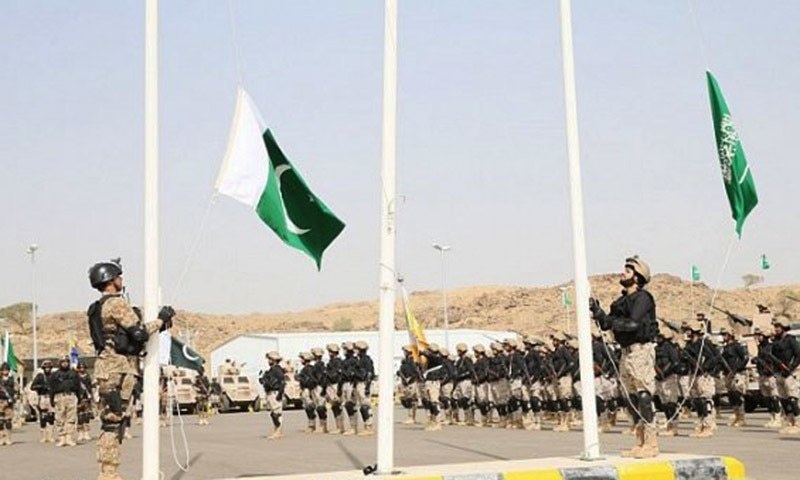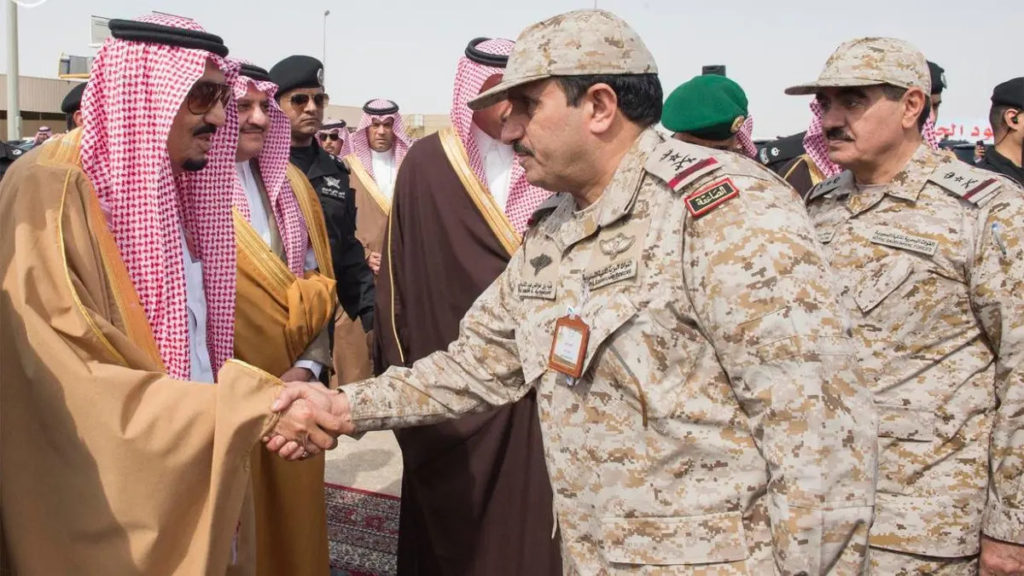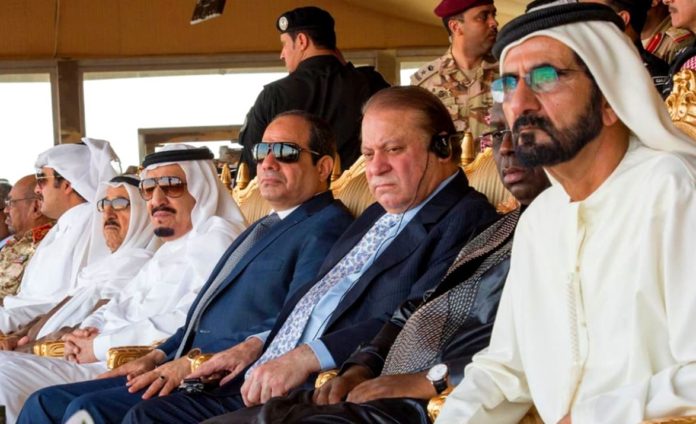The Kingdom of Saudi Arabia recently hosted the world’s biggest military exercises “North Thunder” in terms of participating countries and equipment. North Thunder was held at King Khalid Military City in Hafar Al Batin near the Iraqi and Kuwaiti border from February 14 until March 10, 2016.
According to Saudi Arabian officials more than 35,000 troops from 21 countries rigorously participated in different military exercises. Prime Minister of Pakistan Mian Nawaz Sharif and COAS General Raheel Sharif also was also invited to grace the closing ceremony of the North Thunder.
During his stay in Saudi Arabia Prime Minister Nawaz Sharif and King Salman bin Abdul Aziz al Saud met in Hafar Al Batin and reviewed areas of bilateral cooperation between the two countries and latest developments in the region. Chief of Army Staff General Raheel Sharif and Special Assistant to Prime Minister on Foreign Affairs Tariq Fatemi accompanied the Prime Minister in the meeting.
The Prime Minister also attended a dinner hosted by King Salman bin Abdul Aziz al Saud in honour of the heads of states and governments of twenty-one countries. Earlier, Nawaz Sharif and leaders of other countries attended the closing ceremony of North Thunder exercises at Hafar Al Batin. Pakistani troops were part of the show in the closing ceremony which performed air drops and air assault.
During the visit, the Pakistani leadership offered to expand its cooperation with the Saudis apart from its support for the 34-nation coalition of Islamic countries cobbled together by Saudi Arabia to fight terrorism. The government of Pakistan also offered a long-term training programme for Saudi Arabia’s military.
During the closing ceremony warplanes roared overhead, tanks rumbled across the desert while smoke filled the sky. As the dignitaries watched from a pavilion, Apache gunships fired rockets with bone-shaking blasts. Smoke rose from targets on the ground and commandos rappelled from helicopters.
Fighter jets streaked through the sky releasing orange flares, artillery shells whistled through the air and heavy machinegun fire boomed from across the drill site, which stretched for dozens of kilometres. The exercise was seen as the first practical move towards formalisation of the military alliance.
The large-scale military parade was held in the presence of Bahrain’s King Hamad, Jordan’s King Abdullah, Qatari Sheikh Tamim bin Hamad Al Thani, Crown Prince of Abu Dhabi Sheikh Mohammed bin Zayed Al Nahyan, Sudan’s President Omar Hassan Al-Bashir, Senegal’s President Macky Sall, Mauritania’s President Mohamed Ould Abdel Aziz, Djibouti’s President Ismail Omar Guelleh, President of Comoros Dr. Ikililou Dhoinine, Yemen’s President Abed Rabbo Mansour Hadi, Prime Minister of Pakistan Nawaz Sharif, Premier of the Moroccan government Abdulilah Benkirane, Deputy Prime Minister and Defense Minister of Kuwait Sheikh Lieutenant General Khalid Al-Jarrah Al-Sabah, Mauritius Deputy Prime Minister Shaukat Sudhn, Oman’s Minister for Defense Affairs Sayyid Badr bin Saeed bin Hareb, Commander of the Armed Forces of Malaysia Zu Al kifili Mohamed Zain, Minister of Defense and National Security of Maldives Adam Sharif, Commander of the Armed Forces in Brunei Major General Baheen Muhammad Taweih, Minister of Turkish National Defense Ismet Yilmaz Minister and Personal Representative of the President of Tunisia Al-Azhari Karoui Chebbi.
Through the successful staging of North Thunder the Kingdom has firmly established itself as a major power in the region. It is also a role model globally for its economy and stability, and is effectively countering the influence of Iran in neighboring countries. It has adopted a foreign policy based on respect for international law and United Nations conventions, which has garnered it much respect regionally and internationally. It has never been involved in any military and political adventures. It has never been done anything against the regional and international peace. It has been at the forefront of aid and humanitarian efforts globally without regard to race, sex or religion, he said.
Now it has formed advantageous strategic alliances with powerful nations which will provide it comparative advantage in terms of military superiority and marginalize Iranian influence in the region. Saudi Arabia’s more assertive role has ensured that Iran’s influence has been reduced in Yemen, Syria and the Gulf area. Moreover, regional security has been restored by the Kingdom after it reasserted itself politically, economically and militarily as one of the most powerful members of the G20 group of nations.
According to Saudi Press Agency (SPA) North Thunder was the “largest and most important military manoeuvres in the history of the region” which witnessed the use of an array of sophisticated military hardware. The equipment reflected the quantitative and qualitative weapons the forces used included fighter jets of different models, a wide range of artillery, tanks, infantry, air defence systems, and naval forces.
North Thunder drills represented a clear message that the Kingdom of Saudi Arabia and its brothers and friends of participating countries stand united to confront all challenges and maintain peace and stability in the region.

North Thunder was commanded by the Kingdom of Saudi Arabia along with other 21 countries and the Peninsula Shield force as well. The main objective was to demonstrate the high combat readiness of the participating armed forces and their readiness and ability to function successfully in joint operations.
Most of the ground troops were from the Kingdom of Saudi Arabia’s armed forces, with the majority having been deployed from the Royal Saudi Land Forces (RSLF) and Saudi Arabian National Guard (SANG). These troops were joined by specialized forces from the armies of Pakistan, Egypt, Malaysia, Morocco, UAE, Sudan and Jordan. In addition, troops from Senegal, Tunisia, Comoros, Djibouti, Mauritania, Mauritius, Maldives, Kuwait, Bahrain, Qatar, Chad and Oman committed personnel to the joint exercises. From the East, Indonesia, and Brunei (alongside Malaysia) formed a joint coordinating committee with the Saudis. Finally, the Saudis and Turks recently set up a coordination committee for military affairs to plan future large-scale operations into Syria via the Turkish border, and in laying the groundwork for such an eventuality, the first batch of a squadron of Saudi F-15s will soon arrive at the Turkish Incirlik airbase.
Troops from the other five Gulf Arab states the UAE, Bahrain, Kuwait, Oman, Qatar as well as Pakistan, Malaysia, Turkey, Egypt, Morocco, Jordan and Sudan are among those participating in the Ra’ad Al Shamal, or Northern Thunder exercise. Even troops from smaller countries including the Comoros Islands, Djibouti and Mauritius actively participated in the North Thunder joint military exercises.
The joint military exercises involved ground, air and naval forces was one of the world’s most important military exercises based on the number of forces participating and the area of territory used. One of the major goals of the said exercise was to improve training in responding to the threat posed by terrorist groups in and beyond region.
Saudi Arabia has already labeled the joint exercise as a clear message that the coalition of Muslim-majority countries from Africa and the wider Middle East “stand united in confronting all challenges and preserving peace and stability in the region. It also formed a new 35-member alliance to fight terrorism in Islamic countries. It emphasized on training for a ground invasion signals that the Saudis believe that air strikes alone will not defeat ISIS.
The military exercises took place months after Saudi Arabia announced the formation of a 34-nation anti-terrorist coalition. Foreign Minister Adel al-Jubeir said the coalition was formed to “push back and confront the terrorists and those who promote their violent ideologies”.
Saudi Arabia is currently physically engaged a war on its southern border in Yemen where it is attempting to push back perceived Iran-backed Houthi rebels and reinstall the authority of President Abd Rabbuh Mansour Hadi’s government.
North Thunder’s Spillover Repercussions
War games are the game changer especially North Thunder joint military exercises. The entire Middle East and particularly the Gulf Cooperation Council is passing through a difficult time because of intensified pursuits of regional power politics, heavy infiltration from Iran and series of proxy wars in different prats of the Middle East not confined to Syria, Lebanon, Yemen, Bahrain, Libya and Sudan. After lifting of socio-economic sanctions Iran has already spread its webs of ill-designs by making Iraq its military base to exhaust the resources of the GCC and channelized its off-shore strategic alliances like Hamas which is now physically at grounds in Syria. So, military rather joint military exercise was necessary to show Saudi Arabia martial readiness to combat any kind of threat and its allies in the region. Moreover, it also showed Saudi Arabian strategic alliances (21 participating countries) to display solidarity with the Kingdom of Saudi Arabia in times of crises and fight against terrorism.
Complicated, complex and overlapped power politics is going on and on in the Middle East. The US’s Middle East policy is a strategic disaster. The Russian agenda of preventing the fall of Assad is now, in effect, America’s policy. But the Saudi-led coalition and recently concluded North Thunder has the opposite view. Assad created ISIS, and as long as he is in power, the Middle East will continue to be overrun with terrorists. Thus, once the Saudis and their allies get going against ISIS and then move onto Assad and his Iran-supported Shia militias, the policy of the Obama Administration will be completely disregarded.
Northern Thunder thus represents not only the emergence of a major military alliance in the Middle East, but also a major political quandary for Washington. As mentioned, the air strikes being carried out by the U.S.-led coalition have been ineffective in tackling the human catastrophe that has been unfolding for far too long in Syria. While the world might be fixated on ISIS, the Saudis and their allies know that much of the violence plaguing the Middle East is rooted in Assad and the Iranian-created Shia militias.

Concluding Remarks
Northern Thunder is not military signaling being an unprecedented military exercise, but also to send out a political message to USA, Russia, Iran, Yemen, Syria, and Hamas. It has certain socio-economic, geo-political and geo-strategic repercussions.
The exercise has further enhanced their military capabilities, their war game maneuvering, it has fostered bilateral or trilateral military alliances against the common enemies like extremists, terrorists and of course Iran. It cemented their martial preparedness. It further strengthened their cooperative and coordinative mechanisms. It showcased their joint political will to fight against ISIS and to stop Iran for all its proxies in the region. It has already created landmark in the history of Middle East, MENA and GCC military exercises. It showed their peaceful resolve to all the conflicting geo-political and geo-strategic realities.
North Thunder was the first robust memo practically sent out by regional countries headed by the Kingdom of Saudi Arabia, the GCC, MENA and others that clearly affirms that they are capable of stopping any attempt trying to toy around with their security and stability, and a first in which no world-power nations are needed to employ the ‘umbrella organization’ tactic. They are jointly capable enough to defend their boundaries and ideologies in the future.
North Thunder drill has established a new balancing equation for the region. The figures computing that equation first began adding up at the launch of the Decisive Storm operation, then enhanced at Hafar Al-Batin, and finally fortified themselves with the North Thunder military drill.
Its message was loud and clear to all those plotting to spark out chaos and to pounce down nations; to all groups and militias that have established themselves a state within a state especially ISIS. North Thunder was a string warning to Hezbollah, ISIS, al-Qaeda, the other regional radical mobilization forces and all other extremist terrorist organizations to stay at bay from the region.
North Thunder has initiated a new “regional alternative approach” for conflict resolution which completely discarded the old method to involve power brokers like USA, UK or Russia to solve the conflicting realities. It has created a strategic balance between the preserving the great power traditional alliances and regional alliances.
The North Thunder’s strategy banks to fight against Iranian proxies and militias spread in the region. It depicts that all Iranian proxies and militias infiltrating countries will be sized down and cut off, not in a terror-inspired approach, which Iran is quite experienced with, rather in a tactic aligned with international law and by means of politics and military capacities too.
Peace is a holy word but one that has not been so holy in the hot pursuits of power politics in the world so far. Peace is still on a pending wishful list which has been quashed by the proxy wars and infiltrations in the Middle East, MENA, and GCC. Peace has suffered grossly through ill designs of regional supremacy in terms of faiths, sects and ideologies. Let the people, the real sons of the soil (Middle East, MENA and GCC) decide for themselves their lives, ideologies and loyalties for achieving greater regional socio-economic prosperity and connectivity. The Kingdom of Saudi Arabia is open, transparent and accommodating to resolve the regional issue on table and not through tanks. Time and again, its head of the state and foreign ministry have shown willingness to settle disputes with Iran through different spells of dialogues and diplomacy. An amicable response from Iran is still awaited.




